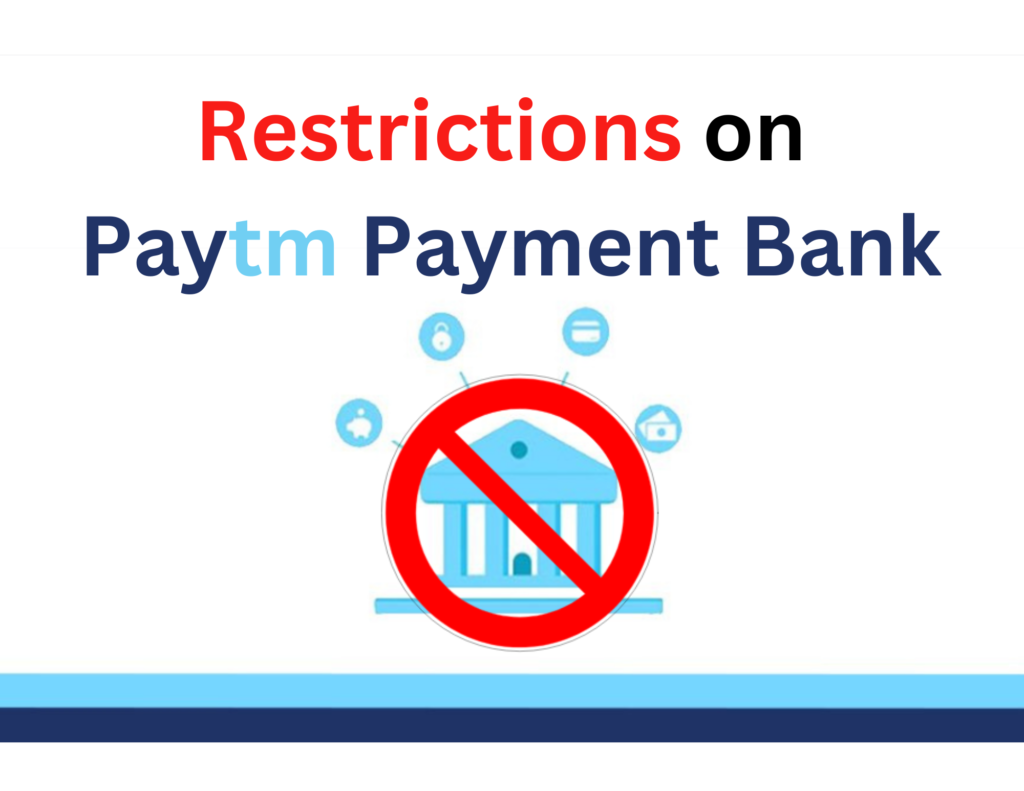Restrictions on Paytm Payment Bank

If you have been a Paytm customer, the past few months must have been quite challenging due to Restrictions on Paytm Payment Bank. These rules came into effect from March 15. The Reserve Bank of India (RBI) had imposed strict Restrictions on Paytm Payments Bank Ltd (PPBL). This move comes after an audit report highlighted persistent non-compliances and supervisory concerns within the bank. Theme The Reserve Bank of India (RBI) has imposed restrictions on Paytm Payments Bank (PPBL), bringing all transactions to a halt. Let’s analyze the factors that contribute to RBI’s action and its impact on the industry. Many questions were confusing the customers that, will their Paytm Payments Bank account continue after March 15? On January 31, the Reserve Bank of India imposed restrictions on Paytm Payments Bank, including a bar on accepting fresh deposits and doing credit transactions after March 15 2024. The regulator found major irregularities in KYC, which exposed the customers, depositors and wallet holders to major serious risks. On February 16, RBI issued frequently asked questions (FAQs) for Paytm bank account holders of on what happens after March 15 2024. KEY POINTS Deposit Restriction: Starting from February 29, 2024, PPBL is prohibited from accepting any new deposits, top-ups, or credit transactions into its accounts or wallets. This restriction also applies to its prepaid instruments such as FASTags and National Common Mobility Cards (NCMC). Service Restrictions: The ban includes various banking services like Aadhaar Enabled Payment System, Immediate Payment Service, bill payments, and UPI transactions. PPBL must complete all pending and nodal account transactions by March 29, 2024, after which no further transactions will be allowed. Nodal Account Closure: PPBL is required to close the nodal accounts of its parent company and Paytm Payments Services by February 29, 2024. Overview of the Restrictions From February 29, 2024, Paytm Payment Bank is barred from accepting further deposits, top-ups, or credit transactions into its accounts or wallets. This restriction also extends to its prepaid instruments, such as FASTags and National Common Mobility Cards (NCMC). Customers will no longer be able to deposit money into their accounts or wallets. This will affect their ability to use these funds for various transactions, including online purchases, bill payments, and money transfers. Users of FASTags and NCMC cards will not be able to reload their cards, potentially disrupting their usage for toll payments and public transportation. The prohibition on these services will significantly restrict customers’ ability to perform routine banking transactions, impacting their financial flexibility. Customers will need to seek alternative banking channels or services to carry out these transactions, potentially leading to their inconvenience and additional costs. The restrictions also extend to several essential banking services. Paytm Payment Bank is prohibited from offering: Aadhaar Enabled Payment System (AEPS): A service that allows customers to carry out banking transactions using their Aadhaar number and biometric authentication. Immediate Payment Service (IMPS): A real-time interbank electronic fund transfer service. Bill Payments: A service that enables customers to pay utility bills, recharge their mobile phones, and make other routine payments. Unified Payments Interface (UPI): A system that allows instant money transfers between bank accounts using a mobile device. Closure of Nodal Accounts Paytm Payment Bank is directed to terminate the nodal accounts of its parent company, One97 Communications, and Paytm Payments Services by February 29, 2024. Nodal accounts are used to manage funds related to payment processing, ensuring that transactions are completed efficiently and securely. The closure of nodal accounts will disrupt the flow of funds for payment processing, affecting merchants and service providers who rely on Paytm Payment Bank for transaction settlement. Businesses will need to transition to alternative payment processing solutions, which may involve technical, operational, and financial challenges. Also all pipeline and nodal account transactions must settle by March 29, 2024. No further transactions will be permitted thereafter, effectively halting all activities related to these accounts. Reasons behind the restrictions The RBI has imposed Restrictions on Paytm Payments Bank due to certain non-compliance issues related to KYC and AML norms. KYC is an important process that helps banks verify the identity of their customers. It is a mandatory process for all banks in India. AML refers to the measures taken to prevent money laundering and terrorism financing. According to the RBI, Paytm Payment Bank has been deficient in its KYC and AML procedures, which has resulted in certain irregularities in its operations. The RBI has also stated that the bank has not submitted the necessary reports on the irregularities, which has led to significant concerns about the bank’s operations. The RBI believes that these irregularities may pose a risk to customer accounts and the banking system’s stability. Hence, the RBI has taken necessary measures to ensure that Paytm Payment Bank complies with the guidelines and enhances the security of its operations. Impact of the restrictions on Paytm Payment Bank The restrictions imposed by the RBI are likely to have a significant impact on Paytm Payment Bank’s operations. The bank will not be able to onboard new customers until further notice, which will limit its growth prospects. The bank may also face challenges in meeting the RBI’s guidelines on KYC and AML norms, which may require significant investments in its systems and processes. The bank may also face regulatory penalties for non-compliance, which could affect its financial performance. However, Paytm Payment Bank has stated that it is committed to complying with the RBI’s guidelines and ensuring the safety and security of its customers’ accounts. The bank has also stated that it will take necessary measures to address the concerns raised by the RBI. Conclusion Paytm Payment Bank is a popular digital banking platform in India that offers a range of banking services. However, it has faced several restrictions from the RBI due to non-compliance with KYC and AML norms. These restrictions are likely to have a significant impact on the bank’s operations and growth prospects. The RBI has taken necessary measures to ensure that Paytm Payment Bank complies with
